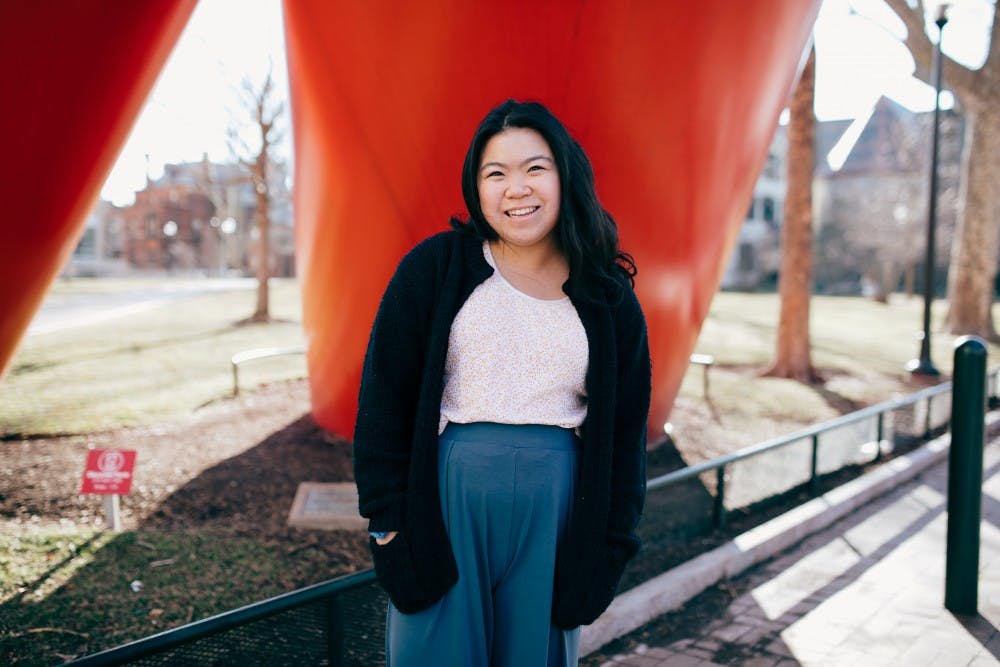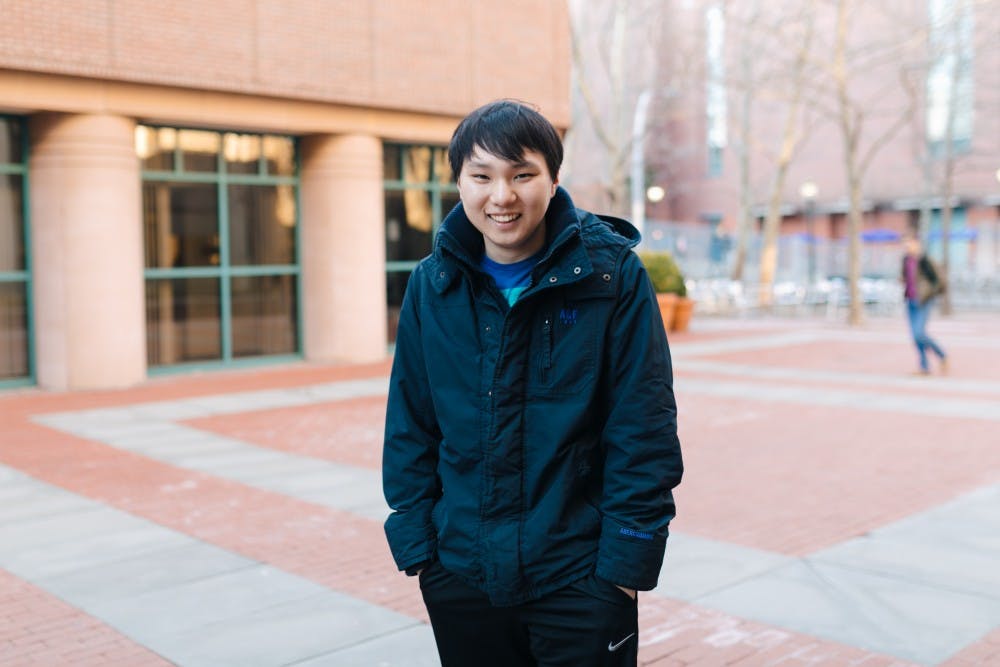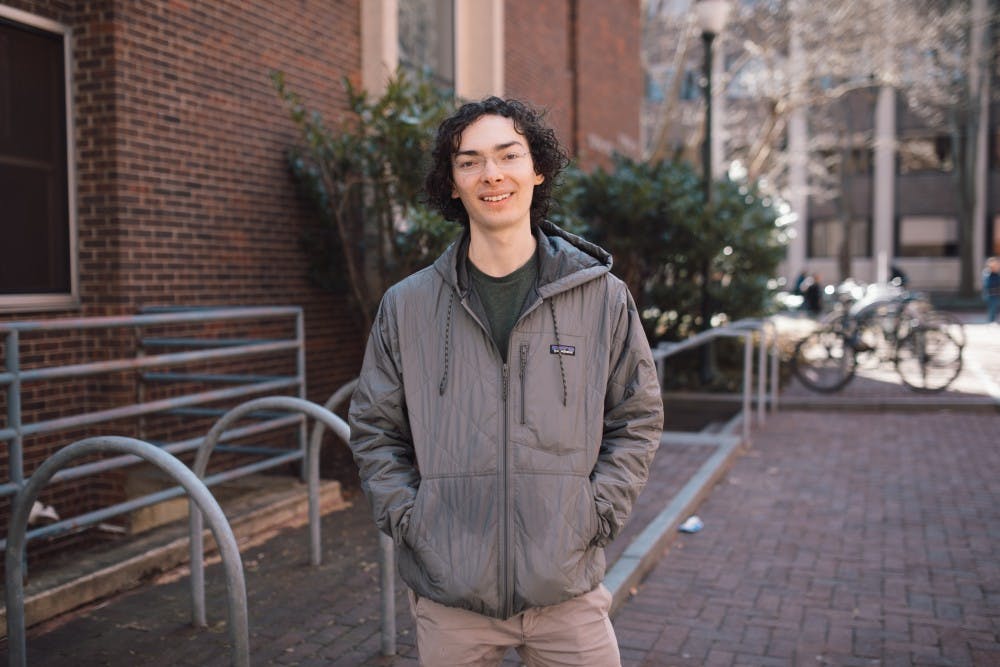Each weekend, Hyuntae Byun (C ‘20) bikes 30 minutes to Old City, walks into The Franklin Fountain, puts on a bow tie, and gets ready to work. At the old–timey ice cream parlor, he spends hours scooping ice cream from stainless steel tubs into waffle cones for a constant stream of strangers.
Sometimes, his customers include Penn students; Hyuntae says he can usually spot them. Part of his job involves being conversational, so he’ll ask about where they go and what they study. It’s a familiar conversation, involving most of the usual Locust Walk niceties. At a certain point, though, they may start trying to explain some aspect of Penn to him, like what “BBB” stands for.
“I’ll be like, ‘Oh, cool. Do you enjoy it?’” he says. “At a certain point, maybe it'll come up that I'm also a student here, and then it's kind of weird how differently people change in that moment. It goes from ‘You’re just a stranger’ to ‘Oh, you’re on my level?’”
Hyuntae found his way to The Franklin Fountain in order to supplement his income. He has a work–study position at a microbiology lab at Penn, but needed another job to help pay for tuition. Many Penn students take jobs in the form of work–study grants, working on–campus in administrative branches or research labs to both gain experience and supplement their financial aid packages. But not everyone can find the jobs they need or want on campus. Students looking for unique work experiences or wanting to work more hours need to venture beyond Penn’s serene labs and offices. Some of them go into the service industry. They look after three–year–olds. They cure, spice, and smoke short ribs. They scoop perfectly sized balls of ice cream. Beyond the confines of Career Services and Handshake, these jobs require skills students can’t always hone on campus.

Karissa Lam
Karissa Lam (N ‘20) works as a nanny and babysitter. She started nannying in her junior year of high school when she was hired by her mother’s coworker. Even after coming to Penn, she returned to nannying during the summer. “There aren’t a lot of nursing–specific jobs when you’re just fresh out of freshman year,” Karissa explains.
She works during the semester as well, but it’s hard to nanny as a full–time student. Unlike babysitting, the job demands significantly more time and investment. “Nannying is more active than babysitting,” Karissa says. “You need to drive the kids places.” Since she doesn’t have a car at Penn, she sticks to babysitting jobs, which she finds through the Penn Nursing newsletter. Depending on each family’s needs, she does everything from taking kids to sports practices, tutoring, washing vegetables, preparing lunch, and doing laundry.
While Karissa found her job as a way to gain nursing experience, Hyuntae got his job for financial reasons. Still, he says he’s learned from the experience.
“It’s actually really difficult to scoop ice cream,” Hyuntae says. For his first week, he had to weigh out each serving. “It’s like six to eight ounces for a single scoop and you have to get within a certain range every time. It’s incredibly stressful!”

Hyuntae Byun
The mint chocolate chip, which was his favorite flavor when he started, has become his least favorite. “It’s got so many chips in it, so the texture of it makes it really hard to compact it. Half the time it will fall off the cone and people will come back and ask for more.” Hyuntae also learned that scooping takes a lot of energy: “One of the things they tell you is to scoop using your bicep or you’ll get arthritis at the age of 20.”
While Hyuntae works the counter, Xander Gottfried (C ‘21) works in the kitchen. Every Saturday, he works as a cook at Abe Fisher, a restaurant near Rittenhouse Square owned by the restaurant group behind Zahav and Federal Donuts. Xander enjoyed cooking before coming to Penn—and had cooked every day back at home—but his room in the Quad didn’t have a kitchen.
To find an outlet for his passion, he cold–emailed local chefs and asked for an internship in their kitchen. After a five–minute interview with the head chef of Abe Fisher, he was hired. But cooking isn’t all fragrant herbs and colorful spices: Xander has to stand for the entire duration of his 12–hour shift, lift heavy boxes, and reach into ovens as hot as 500 degrees.
At Abe Fisher, Xander is in charge of the annex station: “I take the dishes from other stations and lessen their load so that everything moves more smoothly,” he explains. He often makes short ribs, which the restaurant is known for.
To make them, he first cures raw short ribs in a spice mix for ten days. At the beginning of each shift, he pulls out about eight of them and rinses them off to get rid of the excess salt and spices. After smoking them for an hour, he submerges them in canola oil and puts them in the oven for two and a half hours. Prep time can be stressful, because he only has five hours to get ready before opening. “You don't want to be scrambling to finish making some sauce,” Xander says, “when someone's ordered the dish that the sauce goes on.”
Working in the service industry, often associated with difficult customers, physical demands, and late hours, involves skills and scenarios that these students don’t encounter as much on campus.
Karissa, for example, spends a lot of time observing family dynamics. She works with all kinds of parents—some overbearing, some possessive—and sometimes she sees room for improvement. But as a domestic employee hired by the family, she keeps her opinion in check. “If only they did this, then they could fix that problem,” Karissa says, “but it’s not my job to tell them how to parent, you know?”
For Hyuntae, there is a big difference between approaching school and approaching a job. “There are definitely days when you show up at work and you don’t want to do this,” he says, “but it doesn’t really matter how you feel about it.” It’s different from school: you can procrastinate on schoolwork, but you can’t skip your shift.
Working in service has made Hyuntae think more critically about the way people view service work. “A lot of times, people will treat you as a means of getting something or an obstacle to getting something,” he says. People often cut him off while he’s explaining something then ask him to explain it again. He’s had a man use him as a tool in a fight with his female partner. The man and the woman were fighting over who was going to pay when the man shoved the woman’s hand away and said to Hyuntae, “If you’re a real man, you’ll take my money.” One time, a woman spat on his face because The Franklin Fountain didn’t have frozen yogurt.

Xander Gottfried
For Xander, working in service has made him think more about what cooking means to him. When cooking went from a hobby to a job, it came with additional labor that he wasn’t used to, like getting burned and lifting heavy things for other people. That got Xander to reevaluate what exactly he’s doing all this work for. “I learned that serving someone is a beautiful concept,” he says. “You're putting so much passion into something, you're working on it so hard, and then it's being served to someone who's going to then enjoy those efforts. It took me a while to understand that.”
Working in an environment removed from a college campus gives these students unique opportunities to get away from Penn. Saturdays are a break from campus life for Xander. “When I go to Abe Fisher, I forget about all [my exams]. It’s a different life. It’s still stressful, but it’s a different kind of stress … I guess you could call it procrastinating.”
Karissa loves talking to people who aren’t her age, like the parents and younger kids. “When I came to Penn, I was like, ‘Man, I’m only talking to 18 to 24–year–olds.’” She also develops personal relationships with the families she works with. One parent she works for is a Penn Nursing alum and lets Karissa borrow her old textbooks sometimes. Above all, she says, getting off–campus is a way to remember that there’s more to the world than Penn. “It’s good to get out and realize that life goes on.”
Shinyoung Hailey Noh is a sophomore studying English and Cinema Studies from Seoul, South Korea. She is a features staff writer for Street.
